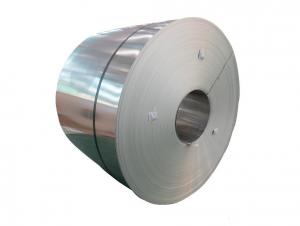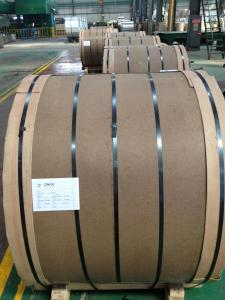Direct Casting Aluminium Strip in Coil AA1100 Temper F
- Loading Port:
- China Main Port
- Payment Terms:
- TT or LC
- Min Order Qty:
- -
- Supply Capability:
- -
OKorder Service Pledge
OKorder Financial Service
You Might Also Like
1.Structure of Product Description
Direct Continuous Aluminium Strip in Coil is one semi-finished aluminium material. The Temper is F, it means Free Temper. This strip can be rolled down to aluminium coil,sheet,circle ect, especially aluminium coils and sheet. The alloy AA1100 is widly used in building, industry ect. Its weight is much lower than steel. So many customers choosed aluminium material instead of steel.
2. Main features of the product
a.Competitive price---We have our own mills and can produce mill finished aluminium coils, so we can control the production cost better.
b.Professional after-sale service---We have more than 15 years exportation experience and you need not worry about the exporation problems.
c.Fast delivery time---We can control the delivery time within 35 days.
3.Image
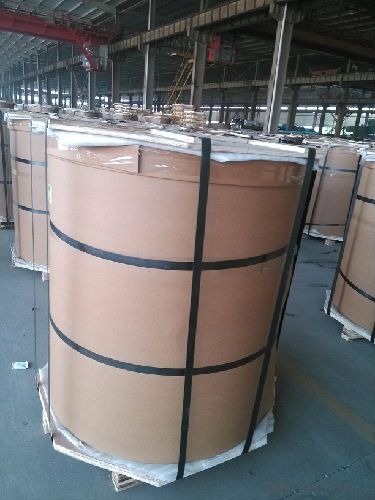
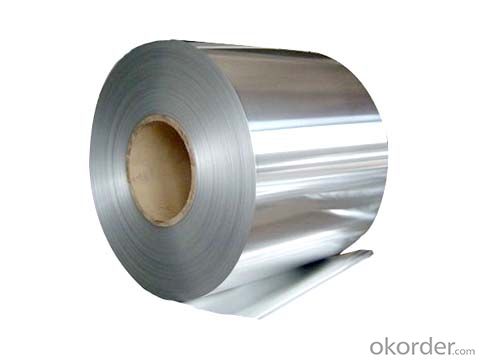
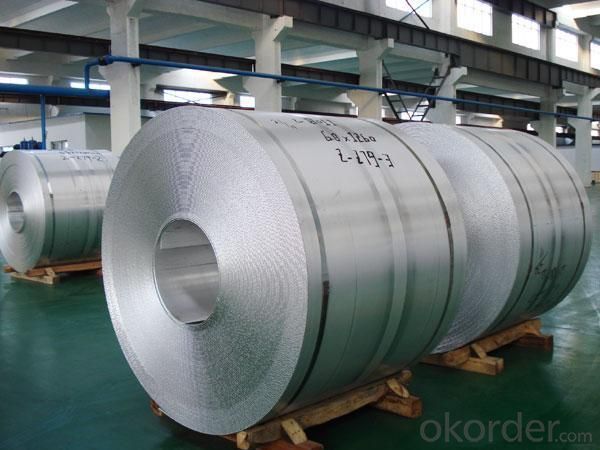
4. Products Specification
| Alloy | Temper | Final Usage | Coil ID | Coil Weight |
| AA1100 | F | Aluminium sheet, coil | 610mm | 5-6 tons |
5. FAQ
What is the quality standard?
---Usually our standard is GB3880-2006
What is the largest width?
---It is 2300mm
What is the MOQ?
---Usually we can accept 80 tons.
- Q:Im doing an assignment for science and i need to know the nuclear charge of Aluminium?and also is there a difference between Aluminium and Aluminum or can it just be spelt differently?
- ALUMINIUM ALUMINUM ARE ONE SAME ELEMENT . the nuclear charge means number of protons . the number of protons electrons are ALWAYS equal = 13 e- = p
- Q:Are aluminum coils suitable for insulation jacketing?
- Yes, aluminum coils are suitable for insulation jacketing. Aluminum is a popular choice for jacketing material due to its excellent thermal properties, durability, and corrosion resistance. It is widely used in various industries, including HVAC, oil and gas, and petrochemical, for insulating pipe systems and equipment. Aluminum coils provide a protective covering around insulation materials, preventing moisture ingress and maintaining thermal efficiency. Additionally, their lightweight nature makes them easy to install and transport. Overall, aluminum coils are a reliable and effective solution for insulation jacketing applications.
- Q:What are the various surface finishes available for aluminum coils?
- Aluminum coils offer a variety of surface finishes to meet different needs and preferences. The options include: 1. Mill Finish: This is the most basic and natural finish achieved by passing the coil through rollers during manufacturing. It gives the aluminum a smooth, shiny appearance. 2. Anodized Finish: Anodizing is an electrochemical process that adds a protective layer to the aluminum coil's surface. It comes in various colors and provides enhanced resistance to corrosion, abrasion, and wear. Architects commonly use anodized finishes. 3. Painted Finish: Aesthetic appeal and environmental protection can be achieved by coating aluminum coils with paint. The paint comes in different colors and finishes, such as matte, glossy, or metallic. 4. Brushed Finish: By brushing the surface with abrasive materials, aluminum coils can have a textured appearance with fine lines or scratches. Brushed finishes are often used for decorative purposes. 5. Polished Finish: Buffing the surface of the aluminum coil creates a smooth, reflective finish. It gives a mirror-like appearance and is commonly used for decorative and architectural applications. 6. Embossed Finish: Embossing involves stamping or pressing a pattern or design onto the surface of the aluminum coil. This finish adds texture and depth, making it suitable for non-slip surfaces or decorative purposes. 7. Laminated Finish: Lamination involves bonding a thin layer of film or foil to the aluminum coil's surface. This finish provides additional protection against scratches, stains, or UV radiation. It is commonly used for applications that require durability and resistance. These examples highlight the range of surface finishes available for aluminum coils. The choice of finish depends on specific application requirements, desired appearance, and functional properties needed for the end product.
- Q:How do aluminum coils contribute to lightweight construction?
- Due to its properties as a metal, aluminum plays a crucial role in lightweight construction. Its low density sets it apart from other metals like steel or copper, making it significantly lighter. When formed into coils, aluminum increases its surface area, resulting in more efficient heat transfer and distribution. The utilization of aluminum coils in various industries such as automotive, aerospace, and construction leads to a notable reduction in overall weight. This reduction offers several advantages, including enhanced fuel efficiency in vehicles, increased payload capacity in aircraft, and easier handling and installation in construction projects. Furthermore, the lightweight nature of aluminum coils enables designers and engineers to develop more innovative and energy-efficient designs. With less weight to support, thinner and lighter materials can be used for other components, resulting in additional weight savings. This not only saves costs during manufacturing and transportation but also reduces environmental impact. Moreover, aluminum coils possess excellent corrosion resistance, making them ideal for outdoor applications. Their ability to resist rust and corrosion adds to their durability and longevity, ensuring that lightweight structures made with aluminum coils can withstand harsh environmental conditions. In conclusion, aluminum coils contribute significantly to lightweight construction by providing a durable and lightweight material. This enables designers and engineers to create more efficient and sustainable structures, vehicles, and products. The use of aluminum coils not only reduces the weight of the overall construction but also offers benefits such as improved fuel efficiency, increased payload capacity, and cost savings.
- Q:What is the flexural strength of aluminum coils?
- The flexural strength of aluminum coils varies depending on the specific grade and thickness of the aluminum used. Generally, aluminum coils have good flexural strength due to the inherent properties of aluminum, which is known for its high strength-to-weight ratio.
- Q:Yep a slogan...the element Aluminum
- Aluminum, unlucky # 13. or...Aluminum, fun to say-hard to chew. Aluminum says, stop staring at my cans. I 3 recycling.
- Q:Can aluminum coils be formed or shaped?
- Certainly, aluminum coils have the capability to undergo formation and shaping. Aluminum, being an extremely pliable metal, can effortlessly be molded or bent into diverse configurations without experiencing any fractures or breaks. Aluminum coils frequently find usage in numerous applications including the production of heat exchangers, condenser coils, evaporator coils, and air conditioning systems. These coils can be transformed into various structures such as flat sheets, tubes, or finned coils, catering to the specific demands of the intended purpose. The adaptability and formability of aluminum coils render them exceptionally versatile and extensively employed across multiple industries.
- Q:Are aluminum coils compatible with other materials?
- Yes, aluminum coils are compatible with other materials. Aluminum is a versatile and widely used material that can be easily integrated with various other materials in different applications. For example, aluminum coils can be used in conjunction with copper tubing in air conditioning and refrigeration systems to enhance heat transfer efficiency. Additionally, aluminum coils can be coated or laminated with other materials such as polymers or paints to provide additional protection against corrosion, improve aesthetics, or enhance specific performance characteristics. Therefore, aluminum coils offer compatibility with a range of materials, making them suitable for diverse applications in industries such as construction, automotive, aerospace, and more.
- Q:To put aluminum heads on my car do i have to add other things or basically can i just get them and put them on
- Aluminum heads will warp the first time the engine accidentally overheats. Why would you go with aluminum?
- Q:Can aluminum coils be used in the production of electrical conductors?
- Yes, aluminum coils can be used in the production of electrical conductors. Aluminum is a highly conductive metal and is commonly used in various electrical applications due to its lightweight, cost-effectiveness, and excellent electrical conductivity.
1. Manufacturer Overview |
|
|---|---|
| Location | |
| Year Established | |
| Annual Output Value | |
| Main Markets | |
| Company Certifications | |
2. Manufacturer Certificates |
|
|---|---|
| a) Certification Name | |
| Range | |
| Reference | |
| Validity Period | |
3. Manufacturer Capability |
|
|---|---|
| a)Trade Capacity | |
| Nearest Port | |
| Export Percentage | |
| No.of Employees in Trade Department | |
| Language Spoken: | |
| b)Factory Information | |
| Factory Size: | |
| No. of Production Lines | |
| Contract Manufacturing | |
| Product Price Range | |
Send your message to us
Direct Casting Aluminium Strip in Coil AA1100 Temper F
- Loading Port:
- China Main Port
- Payment Terms:
- TT or LC
- Min Order Qty:
- -
- Supply Capability:
- -
OKorder Service Pledge
OKorder Financial Service
Similar products
New products
Hot products
Related keywords

